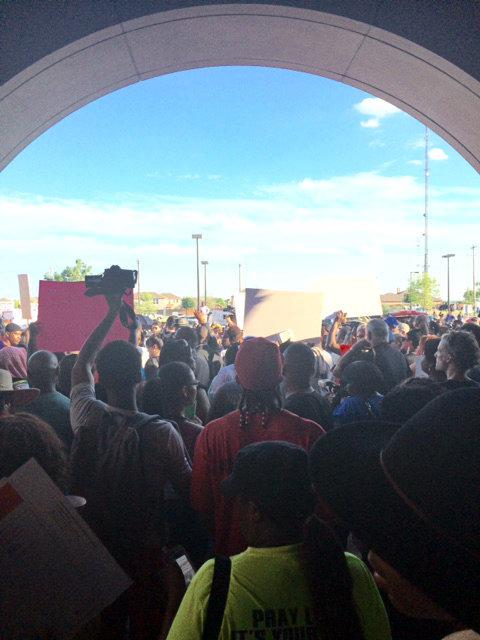Despite the fact that in 2014, Money magazine named McKinney, Texas, a small suburb located just outside of Dallas, "the best place to live in America," for the past few days the town has been inundated with media attention in response to circulated images of a white police officer cursing, pointing his weapon at and physically assaulting black teenagers as young as 14 in an attempt to break up a pool party at a subdivision. A teenager at the party filmed and uploaded video of the incident to YouTube on Saturday and it quickly went viral.
The police were reportedly called to the scene following what was at first a verbal, but quickly escalated to a physical, altercation between two white female community members and two teenage partygoers (one of whom was white and the other black) after the adults hurled racial slurs at both young people, and then slapped one, while yelling that they should leave the area and "go back to your Section 8 housing."
The hate-fueled reference to the federally funded Section 8 housing program, which provides housing subsidies for low-income participants, is significant because it, as well as McKinney and surrounding areas, are at the heart of a soon-to-be decided Supreme Court case that has the potential to either reaffirm our commitment to, or fully gut, fair housing laws designed to promote racial and economic integration.
The events in McKinney make a stronger argument than could almost any lawyer for why the court should affirm the importance of racially and economically integrated residential areas.
The Supreme Court case was brought against the Texas State Housing Authority by a nonprofit organization that works to promote integrated communities. The nonprofit, Inclusive Communities, showed that the Texas Housing Authority assigned nearly all of the affordable housing tax credits to Dallas's black neighborhoods and almost none of it to white neighborhoods where residents, like those in McKinney, consistently organized to make clear that they did want to have many, if any, Section 8 families among them. The federal judge hearing the initial case ruled that there was no intentional discrimination on the part of Texas Housing Authority officials, but his opinion still held that the outcome unacceptably increased housing segregation and that the housing agency could have taken steps to ensure that affordable housing units were allotted more equally.
In response, the Texas Housing Authority appealed the ruling, but lost again. That would have been the end of the case if the Supreme Court had not asked to have it argued before them in January. An array of industry and conservative groups are backing Texas in its effort to roll back Fair Housing Act enforcement. Civil-rights organizations, along with 17 states and more than 20 large cities and counties, are siding with Inclusive Communities.
This case is important because it is well understood that housing segregation is the foundation of much of the racial inequality in the United States. Indeed, though the formal barriers to residential integration were long ago lifted, many African-Americans still face limited housing choices and live in poor neighborhoods that lack the infrastructure and environmental safety of close-by affluent neighborhoods that are often overwhelmingly white. Residential segregation also makes equal access to quality education, employment, homeownership and wealth accumulation far more difficult.
Finally, and perhaps most importantly, it denies the potential for white community members in neighborhoods such as McKinney to learn that they have nothing to fear from American citizens who may not share either their race or economic backgrounds. Let's hope our highest court thinks this is important, as well.
Rooks is an associate professor in Africana Studies and Feminist, Gender, Sexuality Studies at Cornell University.


Spread the word